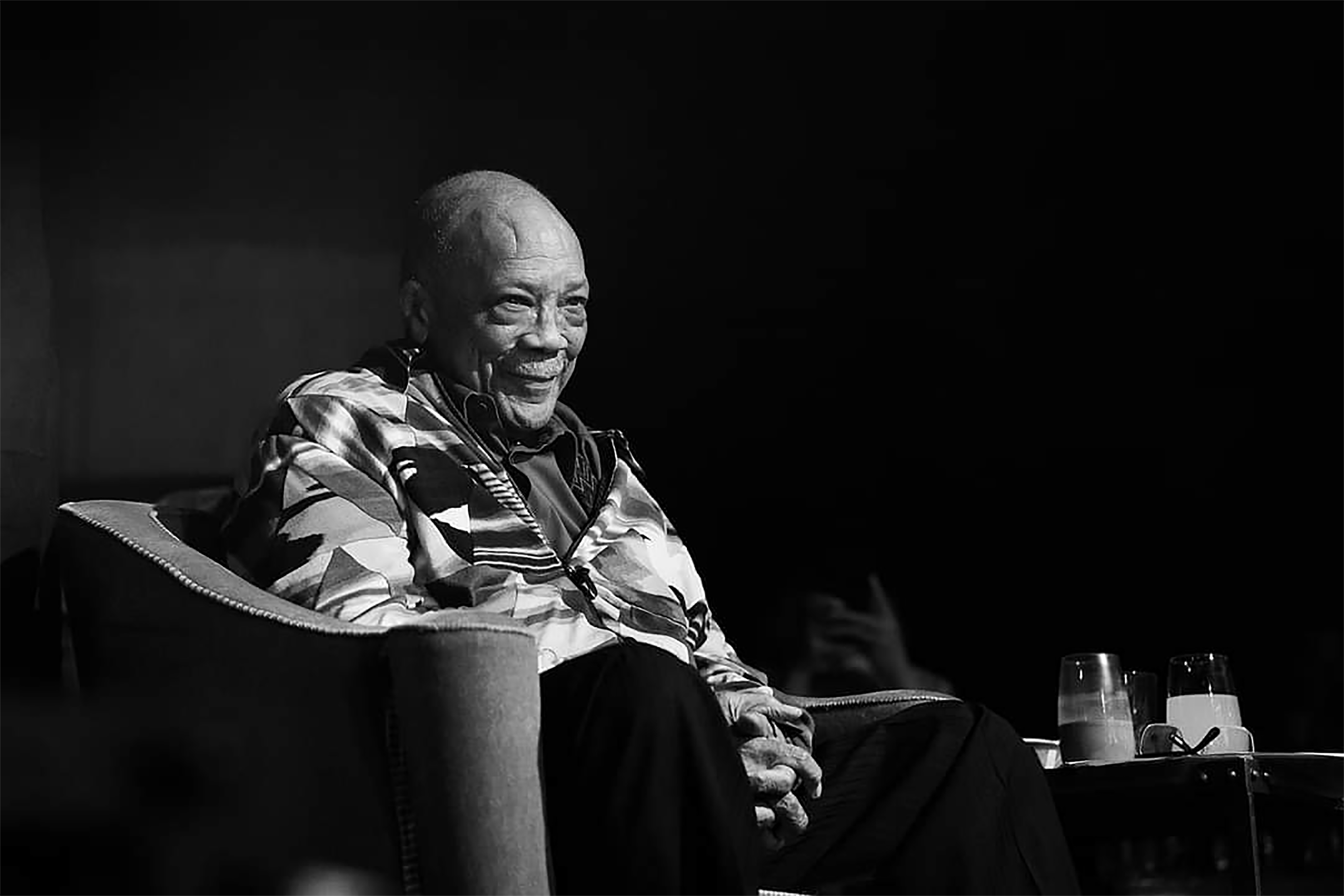EXTRAORDINAIRE: Quincy Jones was an award-winning composer and record producer for legendary musicians such as Frank Sinatra, Michael Jackson, Celine Dion and Aretha Franklin.
By Biography Editors and Catherine Caruso
Quincy Jones, a music titan who had a profound impact on multiple musical genres, died in his Bel Air, California, home on November 3. He was 91 years old. His publicist said he “passed away peacefully” surrounded by family but didn’t provide a cause of death.
“Tonight, with full but broken hearts, we must share the news of our father and brother Quincy Jones’ passing,” the family said in a statement. “Although this is an incredible loss for our family, we celebrate the great life that he lived and know there will never be another like him.”
Jones is survived by his three siblings and seven children: Jolie, Kidada, Kenya, Martina, Rachel, Rashida, and Quincy III. Just hours before his death, he wished his daughter Martina a happy birthday via Instagram, writing, “So proud to be yo papa! Big hug, I love you eternally.”
A celebrated musician and record producer, Jones rose to prominence in the 1950s as a jazz trumpeter, arranger, and conductor for Dizzy Gillespie’s band before going on to produce Michael Jackson’s acclaimed album Thriller. Throughout his prolific career, Jones worked with the likes of Frank Sinatra, Ray Charles, and Donna Summer, among many other famous artists, and composed music for film and television, earning an impressive 28 Grammy Awards, an Emmy, and an honorary Oscar throughout his life.
Jones also produced several movies and TV shows, including The Color Purple, The Fresh Prince of Bel-Air, and Mad TV. The 7-time Oscar nominee was set to receive an honorary Academy Award for life achievement later this month.
Who Was Quincy Jones?
Quincy Jones was a decorated record producer, musician, and movie producer who was convinced at an early age to explore music by his teenage friend Ray Charles. He played in various bands through the 1950s, began composing for film and television in the mid-1960s, and eventually produced over 50 scores. Jones worked with famous musicians such as Michael Jackson, Frank Sinatra, Aretha Franklin, and Celine Dion. One of the most nominated and decorated artists in Grammy Awards history, Jones garnered 80 nominations and 28 wins. He also earned an Emmy Award for scoring the 1977 limited series Roots. Jones died in November 2024 at age 91.
Young Quincy Jones
Quincy Delight Jones Jr. was born on March 14, 1933, in Chicago. His mother, Sarah Frances Jones, worked at a bank, and his father, Quincy Delight Jones Sr., was a carpenter and semi-professional baseball player. Quincy spent his early years in Chicago with his parents and younger brother, Lloyd.
After his parents divorced and his mother developed a schizophrenic disorder, he and his brother were sent to live with their paternal grandmother in Louisville, Kentucky. At age 10, Quincy Sr. moved his sons to Bremerton, Washington, outside of Seattle. There, young Quincy gained a stepmother, Elvera, and three step-siblings: Waymond, Theresa, and Katherine. His father and stepmother had three more children together—Jeanette, Margie, and Richard—and later moved the family to Seattle.
Drawn to music at an early age, Quincy Jr. first touched a piano at recreation center when he was 11 years old, which inspired him to join school choir and band, where he learned to play multiple brass, reed, and percussion instruments. He was later recruited to play in a swing band formed by his classmate. After he graduated from Garfield High School in 1950, Quincy studied at Seattle University for one semester before transferring to Berklee College of Music in Boston.
Musician, Producer, and Composer
Despite receiving a scholarship to attend the prestigious Berklee College, Jones dropped out after Lionel Hampton invited him on tour with his band. Jones played trumpet and arranged for Hampton from 1951 to 1953. He then worked as a freelance arranger on many jazz sessions. He served as musical director for Dizzy Gillespie’s overseas big-band tour in 1956, worked for Barclay Records in Paris from 1957 to 1958, and led an all-star big band for the 1959 European production of Harold Arlen’s blues opera Free and Easy.
After returning to New York, Jones composed and arranged for Frank Sinatra’s 1964 album It Might As Well Be Swing, which featured the hit “Fly Me to the Moon.”
That same year, he won his first Grammy Award for his arrangement of Count Basie’s “I Can’t Stop Loving You.” At the time, he was working at Mercury Records as the label’s first Black vice president while simultaneously producing his own increasingly pop-oriented records.
In the mid-1960s, Jones began composing for movies and television, eventually producing over 50 scores and serving as a trailblazing Black musician in the Hollywood arena. He earned his first two of seven total Oscar nominations for scoring In Cold Blood and crafting the song “The Eyes of Love,” with lyricist Bob Russell, from Banning. Both movies released in 1967. His solo Emmy Award recognized his score for the 1977 limited series Roots, based on Alex Haley’s novel of the same name.
In 1970, Jones won another Grammy for his jazz-funk album Walking in Space, taking home the trophy for Best Jazz Ensemble Album. In total, Jones won a whopping 28 Grammy wins out of 80 nominations. He is among the most nominated artists in Grammy history and ranks third for most trophies won by an individual, behind Beyoncé and conductor Georg Solti.
After producing Aretha Franklin’s 1973 album Hey Now Hey (The Other Side of the Sky), he went out on his own to start a record label. In 1975, Jones founded Qwest Productions, for which he arranged and produced hugely successful albums by major jazz and pop figures, including Frank Sinatra. Jones later established Qwest Records as a joint venture with Warner Bros. Records. The first release under the label was George Benson’s Give Me the Night (1980).
In 1978, Jones produced the soundtrack for The Wiz, the musical adaptation of The Wizard of Oz that starred Diana Ross as Dorothy. Michael Jackson portrayed the scarecrow as Nipsey Russell and Ted Ross rounded out the foursome, portraying the tin man and lion respectively. Meeting Jackson led to what was perhaps his most fruitful professional collaboration.
Jones produced the pop singer’s breakthrough solo album Off the Wall in 1979 as well as Jackson’s acclaimed follow-up Thriller. The 1982 album resulted in six Grammy trophies and remains the best-selling record of all-time.
As a movie and TV producer, his most successful projects were the 1985 film The Color Purple—directed by Steven Spielberg and starring Whoopi Goldberg, Oprah Winfrey, and Danny Glover—as well as the 1990s television series The Fresh Prince of Bel-Air, starring Will Smith. The Color Purple was nominated for Best Picture at the 58th Academy Awards.
In 1985, Jones used his clout among major American recording artists to record the much-celebrated anthem “We Are the World” to raise money for victims of famine in Ethiopia. His work on behalf of social causes spanned his career, including the Quincy Jones Listen Up Foundation, which built more than 100 homes in South Africa in 2001. The charity aimed to connect youths with technology, education, culture, and music and sponsored an intercultural exchange between teens in Los Angeles and South Africa.
Ex-Wives and Children
Jones was married three times. His first marriage was to Jeri Caldwell from 1957 to 1966; they had one daughter together named Jolie. Jones was then married to Ulla Andersson, with whom he shares a son, Quincy III, and a daughter, Martina, from 1967 to 1974. Jones’ final marriage was to actor Peggy Lipton. The pair were married from 1974 to 1990, and they had two daughters, Kidada and Rashida Jones, who is a popular actor and filmmaker. He also had two daughters, Rachel and Kenya, from other relationships.
Other Ventures and Controversies
Beyond music and the screen, Jones published the magazines Vibe and SPIN. In 1990, he formed Quincy Jones Entertainment, a co-venture with Time Warner Inc. Q: The Autobiography of Quincy Jones was published in 2001. In September 2018, a documentary entitled Quincy was released by Netflix. The movie was co-directed by his daughter, actor Rashida Jones.
In a GQ interview published in early 2018, the music icon said he liked contemporary artists like Bruno Mars, Drake, and Kendrick Lamar but admitted he was no fan of Taylor Swift’s music, saying, “We need more songs, man. F—ing songs, not hooks.”
He raised more eyebrows with comments from another interview published in Vulture around the same time, alleging that Michael Jackson “stole a lot of songs” and that Marlon Brando and Richard Pryor had slept together.
The legendary producer released a statement shortly afterward in which he apologised for “bad-mouthing” others, signing off with: “I encourage you all to please grow with me & keep on keepin’ on. Love, an 85-year-old bow-legged man who is still learning from his mistakes.” – Biography.com

Quick Facts
FULL NAME: Quincy Delight Jones Jr.
BORN: March 14, 1933
DIED: November 3, 2024
BIRTHPLACE: Chicago, Illinois
SPOUSES: Jeri Caldwell (1957-1966),
Ulla Andersson (1967-1974), and Peggy Lipton (1974-1990)
CHILDREN: Jolie, Rachel, Quincy III, Martina, Rashida, Kidada, and Kenya
ASTROLOGICAL SIGN: Pisces

Why Quincy Jones would ignore ‘racist’ Elvis Presley
IMPRESARIO: While Jones has worked with some of the biggest names in popular culture history, he would never have considered collaborating with the ‘the King of Pop’..
By Joe Taysom
Quincy Jones was never shy about allowing his opinion to slip out. The musician, producer, and composer could boast of one of the most impressive careers in the industry, and much of that was forged in his ability to be a tastemaker.
While that certainly has some benefits, it also has the issue of meaning you are asked your opinions on every single area of the music business at every opportunity.
Over the years, Jones was rarely afraid to share this view, no matter the subject of the question. Having famously taken The Beatles down a peg before apologising to Paul McCartney, it would seem Jones also had an issue with Elvis Presley and labelled the Graceland icon a “racist”.
There is no doubting Quincy Jones’ extraordinary talents. After all, his work behind the production desk speaks for itself. During his storied life, he received a staggering 80 Grammy nominations and masterminded countless hit records. Jones walked on musical water to the degree that nobody would dare question his outspoken opinion, even if he did once describe The Beatles as “the worst musicians in the world”.
During an interview with The Hollywood Reporter as part of their icon series shortly before his death, Jones began reflecting on a career like no other. The piece was largely aimed at celebrating Jones’ work.
However, it would always be unavoidable for a few opinions not to sneak out. While Jones was largely pleasant about his contemporaries, he also had some serious condemnation for Presley.
In a wide-ranging discussion, Jones was asked about his opinion on both Michael Jackson and Elvis Presley, to which he replied: “[Jackson] was doing some Elvis copying, too. ‘The King of Pop,’ man. Come on!” Jones said.
While Jones has worked with some of the biggest names in popular culture history, he would never have considered collaborating with Elvis: “No. I wouldn’t work with him,” he said.
Given Jones’ role as a fantastic producer and Presley’s penchant for pop hits, one might have considered the match good, but Jones refused to entertain the notion.
“I was writing for [orchestra leader] Tommy Dorsey, oh God, back then in the ’50s,” Jones elaborated on why he would ignore The King.
“And Elvis came in, and Tommy said: ‘I don’t want to play with him.’ He was a racist mother — I’m going to shut up now,” Jones notes without too much of a hint of coming through with his threat.
“But every time I saw Elvis, he was being coached by [‘Don’t Be Cruel’ songwriter] Otis Blackwell, telling him how to sing,” he added.
Elsewhere in the interview, Jones discussed the mass racism protests that have erupted after a series of disturbing cases of police brutality.
“It’s been coming a long time, man,” Jones said. “People have been turning their heads the other way, but it’s all the same to me — misogyny, racism. You have to be taught how to hate somebody. It doesn’t come naturally, I don’t think. I don’t think so, unless you’ve been trained. I just think it’s such a bad habit.” – FaroutMagazine































